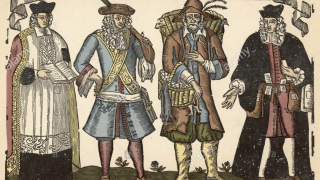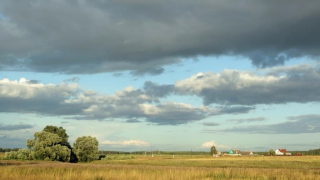The origin and basis of capitalism - The dilemma of a world that runs out
Normativism aims to be a very comprehensive doctrine, and for that reason, standing from the Fourth Political Theory, I made a critique of the main current economic views, beginning with a brief conceptualization of one of the manifestations of liberalism, which is capitalism, along with a review of the history of this system and its limitations.
After the first states were created, they grew in size and complexity throughout history, while the development of new means of transport and communication allowed to overcome natural obstacles that were once formidable barriers. The modes of production were not the same throughout history, as the productive forces developed and the characteristics of each region, based on culture, nature, etc., differentiated from each other.
Mankind create economic systems to manage human and nonhuman resources that each society has in order to obtain the goods and services considered as necessary by every society.
In order to develop our creative ability, we need a framework which determines the way we produce, acquire and distribute these goods and services, including the way human resources are organized and treated, and those frameworks are the modes of production.
Capitalism is one of many modes of production, throughout history there have been others, and capitalism coexisted and coexists with other modes of production, but depending on the region or epoch it has done so as a predominant system in a society or as a subaltern system.
In the first mode of production, characteristic of the tribal societies of hunter-gatherers, there was a scarce division of labour, given the poor development of the material productive forces of society. This mode of production, where there was no private property ownership of the means of production, was called by Engels as primitive communism.
In other times, man, as hunter-gatherer, simply took what nature offered to him, and was not concerned with the regeneration of its natural resources. Humanity observed how everything was spontaneously generated from nature, and the mysteries behind life and behind death were unknown, leading to animistic explanations which gave a soul to natural principles and organisms.
Later, another stage began, where humanity began to think more and more of ways to stimulate regeneration of the resources which nature granted them, leading to the beginning of practices such as agriculture.
The worship of mother earth was replaced by solar and patriarchal cults, where the individual saw life on earth as a mere prelude to life after death, and power groups began to create sophisticated forms of domination.
In Europe, primitive communism was replaced by the slave owning mode of production, in which slaves were a commodity of the owners; and their work force allowed the creation of great wealth for those owners, since the retribution that the slaves received was just so that they could continue working, and sometimes not even for that. The historical development gave rise
to a system of estates, which was based on a discrimination of individuals due to their hereditary or birth condition.
But it should be emphasized that in the case of estates in slave societies, it was common to use prisoners from the wars of conquest as slaves, and in other cases, they were obtained by voluntary sale to pay a debt, or by legal sanction, while the title of patrician or noble could be acquired by diverse circumstances.
For that reason this system was not closed like a caste, existing anyhow a very little social mobility in this order, which for example gave rise to the estates of patricians and plebeians in Rome, and to the establishment of slave ownership.
In some societies, including Amerindian societies, the so-called Asiatic mode of production was installed. There the communities were subject to estates and caste powers that demanded the payment of tributes to the communities, as they were able to control fluvial networks, nevertheless maintaining certain prosperity and unit.
In this system there was no private ownership in the means of production, but there was a division of society into estates or castes, and the different communities, often annexed because of war, were taxed in a way that can be considered as a primitive form of exploitation of man by man.
In Europe, slavery gave rise to feudalism, although this did not happen immediately after the fall of Roman civilization, as popularly thought, since slavery had its climax in the late Middle Ages.
In Feudalism, the serf was no longer a mere commodity separate from his means of labour and lacking in rights, although he was bound to the land of his lord, and had to work also for the landowners, the nobility and the clergy, who demanded certain tributes from the peasants, having ownership of the lands, together with forms of coercion and a State.
Feudal society was also divided into estates, a system whose social right, unlike castes, does not rely as much on religion and tradition as on the official claim of political power.
Later, in capitalism, the wage earner has more freedom than did the serf, since the serf was tied to the land of his master, while the employee has the important freedom to change the company where he works, emerging labour institutions based on the freedom of contract.
The capitalists, that is, those who control the means of production and the State in the capitalist system, engendered what was called by the Marxists as the working class or proletariat, who agreed with the capitalists the price and the conditions to sell their work in the labour market.
In the capitalist system, within what should be regarded as the working people, are all those who can only sell their labour power in exchange for a wage (not only in the industrial sector, but also in the rural sector and in the service sector), including those who are unemployed and white collar workers who act as officials in capitalist businesses.
It is important to take into account that State actions aimed at addressing the situation of workers have as an important objective the ensuring of necessary conditions for accumulation and concentration of capital, instead of merely having the objective of improving the conditions of the working people.
The intervention of the capitalist State in economic and social aspects is necessary in aid of business, being of paramount importance for the functioning of the capitalist system. This intervention has the objectives of generating both an economic climate that allows a greater accumulation and concentration of capital, as well as avoiding the radicalization of the conflict between capital and labour, and even the creation of a situation which could pose a threat to the capitalist order.
The State can intervene in the economic field, with the aim of fighting against unemployment, granting certain minimum welfare standards, financing various undertakings, directing public companies, controlling monetary policy, collecting taxes, etc., and thus being a key agent for the distribution of economic resources. The State also acts in other fields of the social sphere, such as culture, education, health, security, defence, etc.
Several associations increase the direct or indirect political power of large groups of the population in the performance of the State (for example political parties, trade unions and human rights organizations) so that these groups of the population can find a better response to their aims.
Economic power is transformed into a tool for constructing indirect and direct political power in favour of capitalist interests, which means that capitalist economic power has a marked influence on the State's actions, and influences the electoral processes, to the detriment of the political power of the workers and to the detriment of their desires. Even the concessions and alliances that dominant sectors make with the rest, or that are made within dominant sectors themselves, serve to accelerate and maintain capital accumulation in the capitalist State.
Modern welfare states and State intervention in the economy have their origin in attenuating the contradiction between capital and labour. Different groups make considerable pressure to moderate the intervention of the State in economic matters or to directing it towards the benefit of only a minority, with the attitude of this groups being anti-democratic.
Due to the misnamed process of globalization, capitalist companies have acquired great mobility, being able to relocate their productive structures and investments to any part of the world, therefore forcing states to reduce regulation and taxes in order to generate an attractive environment for the investments of private companies.
This implies an increase in the political power of the capitalists and a reduction of the political power of the workers, since the first ones have the possibility of further conditioning the performance of those who wield political power directly, in the opposite direction to the wishes of the working class. Another way by which capitalists control the performance of those who directly wield political is that capitalists accumulate their capital to the point that it does not necessarily have to be productively invested.
Due to not investing it productively, there is an excess of savings within the companies, which occurs to the detriment of the welfare of the working people. Therefore, the economy is highly dependent on the level of confidence of private investors, which must be maintained at an appropriate level by the State, taking into account that redistributive policies and trade unions make that companies tend to contract less people in the face of excess of savings, without the sufficient increase in productivity.
To this is added that such a system, in order not to impoverish itself, needs an indefinite and adequate growth as to maintain investor confidence, and this growth is hindered by the cyclical capitalist crises.
This also collides with the objective of the preservation of natural resources and the fight against climate change, since growth, to be indefinite, requires an increasing depredation of natural resources, and pollution in air, water and land, arising from processes of production.
The capitalist economy as a whole must grow indefinitely in order to remain healthy since the capitalist financial system is based on private investors that like John Maynard Keynes stated have their "animal spirits", which produce in them the need of enough confidence in that when investing, they will obtain an adequate return for their investment, within the framework of the cost- benefit relation that every capitalist must face.
If the capitalist financiers do not invest, the obvious result is unemployment, the fall in aggregate demand resulting from this unemployment, and eventually economic collapse.
Hence, capitalism, to remain healthy, needs an indefinite expansion of consumption, and an indefinite expansion regarding the depredation of natural resources, added to the known problem of pollution.
In order to continue with a healthy system, at least for a while, capitalist states are even trying to make people buy products that they do not really need, and measures are taken at the level of financial and fiscal systems to maintain the health of the overall system in the short term but which in the long run have devastating consequences.
These reasoning regarding the relationship between capitalism and the environmental crisis in the future have been mentioned repeatedly by academic David Schweickart, as one of the ways to justify his economic model, which has both good and bad things, although we will analyse Schweickart’s economic model later on. Some people, when we show them the previous reasoning, that of the incompatibility between the health of the capitalist system and the well-being of the environment, may think that the problem will be solved by colonizing other planets.
But this argument is absurd, not only because habitable planets are several light-years from us, or because terraforming Mars is a business of such colossal scale that we are very far from this, but because we do not even see at present a real effort by humanity in the field of human space exploration.
The death of NASA's budgeting is notorious, together with the fact that Russia, which does not have the great financial power which the United States has, but with technology and experience at its disposal, was able to monopolize the field of human space exploration thanks to the death of NASA's budgeting .
However, the technology that Russia uses was developed essentially by the Soviet Union many decades ago.
Only because the Soviet Union created very good technology used in the Soyuz rockets and spacecraft a long time ago, it can be said that human space exploration was saved from almost extinction in the present.
According to Schweickart, and according to many data, capitalism, in order to stay healthy, not only needs the economy to grow, but this growth must be exponential.
If an economy grows 3% each year, which is the average growth of the United States during the twentieth century, consumption doubles approximately every 24 years, which means that in a century consumption becomes 16 times larger. So, if 3% growth for each year is unsustainable, just imagine Chinese growth rates of 10% in a country with several hundred million inhabitants.
In addition to the above, an increase in consumption does not even always imply an increase in the happiness of individuals.
Although persons in developed countries consume much more than they consumed in the mid-twentieth century, individuals do not feel satisfied with their lives.
According to solid scientific studies, people want certain goods or services not so much for their intrinsic value as for the status that they give us, that is, because they make us members of a type of "club" within a particular group, that becomes a point of reference in relation to other groups.
This means that we can consume more and more, but if we do not perceive that our status increases, we can continue to be equally unhappy.













